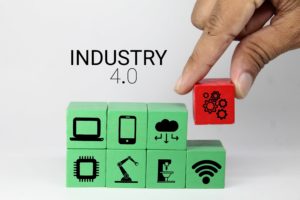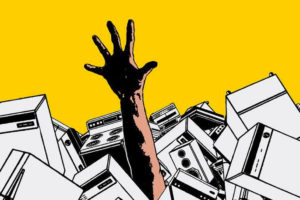
Interview with Adil Mokhles, EcoSpare CEO
17 November 2020 | Automationsense

1) Can you briefly introduce yourself and tell us about your background?
I was born in Casablanca, Morocco where I lived until the age of 30. During this period, I obtained my mechanical engineering degree and worked in two different SMEs in the public works sector. In 2003, I came to France to integrate the specialized master’s degree in marketing of technological innovation at EM-Lyon.
These 2 diplomas allowed me to join the Schneider-Electric group, BU industry, where I worked for 14 years mainly in trade and marketing. In 2018, I returned to the school bench to prepare an MBA at IAE Lyon before leaving Schneider-Electric at the end of 2019. A month later, I created EcoSpare, the industrial spare part management specialist.
2) Why EcoSpare, what needs does it fulfill?
Today, manufacturers suffer from what is called the obsolescence of electrical equipment. Competition from manufacturers of electrical equipment pushes them to constantly innovate to stay in the race and have a technological competitive advantage. The new products are more efficient and less troublesome. Except that descent compatibility is not always respected and changing a product leads to the need to change the entire system.
I will give a concrete example: an industrialist who has a machine or a process that works with an architecture based on a PLC from the Premium range from Schneider-Electric. If the manufacturer has no more spare parts such as E / E card, power supply or other, because this range has been replaced by a new range based on the M340 or the M580, the manufacturer is obliged to change the entire old architecture, although it works very well and can still last a few years. In addition to the fact that this represents a significant budget, it does not contribute to the protection of the environment because the recovered products will end up at the recycling center at 90%.
It is for this reason that we have created EcoSpare, which will launch before the end of 2020, the first French marketplace for the sale of obsolete, used, refurbished or new industrial spare parts. This Marketplace will allow manufacturers, mid-size companies and large companies to enhance the stock of products recovered following a renovation or a dead stock instead of throwing it away. At the same time, SMIs and small mid-size companies that cannot afford to renovate their entire facility can buy these “obsolete” products and extend the life of their equipment.
3) What types of products can be found on the EcoSpare platform?
EcoSpare will launch its platform www.spare-place.com before the end of the year. 5 major categories are planned in the roadmap but only the “Automation” category will be open for sale at launch. In this category, there are more than 5 sub-categories such as programmable logic controllers, industrial terminals, starters and variable speed drives, motion and robotics controllers as well as detectors. We will start with a catalog of over 5,000 products representing over 200 brands. These products will be available, reliable and guaranteed. Several delivery methods will be possible in standard or express.
4) What types of businesses can benefit from your services and how?
Like any marketplace, there are sellers and buyers. In Spare-Place, the community of sellers is represented by 2 types:
1- Professional sellers: these are sellers whose job is to sell obsolete electrical components.
2- Industrial sellers: these are industrialists such as large companies or large ETI companies. They occasionally put on sale dead or useless stock, recovered following a machine or process renovation.
Professional sellers can also be manufacturers of electrical equipment if they want to join the circular economy by repackaging and reselling end-of-range products and products repaired following standard exchange. Buyers are typical industrialists SMIs or small ETIs, which seek to extend the life of their industrial equipment at a lower cost.
5) When do you think a factory can be said to be “Smart”?
The notion of Smart Factory has taken on its full meaning with the emergence of new technologies. A “Smart” factory is a factory which “leverages” all the new technologies to be efficient and meet the Client’s needs around the triptych: quality, price, time.
Indeed, for a factory to be “smart”, it must be automated in order to be able to produce large quantities and / or personalized batches. This automation will allow the factory to be more competitive. The price will therefore be accessible by the client, the deadlines mastered and the product delivered on time.
This automation will also respond to a new need, which is personalization. Today a factory must be able to manufacture products that correspond to a combination of options requested by the client and without stopping production lines. Quite simply, it is a flexible and agile factory.
To be even more competitive, the factory must also be operationally efficient. That is to say, reduce machine downtime or crossing time more generally. This has become possible thanks to the IIOT used in predictive maintenance. It allows you to anticipate breakdowns and change components that show signs of fatigue before they fail.
IIOTs can also be used in the supply chain so that machines are supplied on time and not be starved.
The energy aspect is also important, because a “smart” factory is a factory that uses less energy and therefore is eco-responsible.
Finally, a factory is “smart” thanks to the men and women who work there. If they are well trained and well integrated from the start of the digital transformation, they will be key success factors.
6) Industry of the future, where is France?
Industry is very important for the French economy; it represents 12.4% of GDP when it represents 20% in Germany. 96% of exports come from industry and employ 2.7 million people. The weight of the manufacturing industry has been divided in 2 since 1970, going from 22.3% to 11.2%. This fall is mainly due to the fall in prices (from 2000 to 2007) and the 2008 subprime crisis.
The average age of the production tool in France is 19 years. France has continued to lose competitiveness against its Asian neighbors. The solution for France is to regain competitiveness by taking advantage of the digital revolution and therefore the industry of the future.
France for about 4 years, has been stepping up efforts to gain in competitiveness and multiplying plans through actions undertaken by BPI France, French Tech, French Fab, AIF (alliance industry of the future)….
The current health crisis has also shown areas for improvement in terms of industrial sovereignty. Today, France needs to relocate strategic activities so that they are made in France and make “make or buy” choices. The State’s 120 billion euro stimulus plan is a strong message showing that France needs industry more in these difficult times.
France has one very strong asset, and that is human capital. It has the best European skills and schools that train talented engineers, which is why France has been ranked by the EY firm as the country which attracts the most foreign investors, far ahead of France. ‘Germany and England.
7) Some SME managers find it difficult to perceive the benefits of the Industry of the Future and see this concept as a passing trend. What do you say to them?
I tell them that the industry of the future is indeed the industry of today. It is neither a concept nor a theory. Quite simply, they are solutions that use new technologies to gain competitiveness, agility and operational efficiency.
In brief, to be competitive and continue to exist, you have to embrace the industry of the future and you have to start now.
The benefits are of course measurable through calculations and estimates. If necessary, it is possible to make POCs and see the real gains.
The implementation of the industry of the future is done by technological brick such as predictive maintenance, automation, asset management, operational efficiency, cybersecurity or sustainable development.
The harder part is yet to start!
8) What advice would you give to a young person who would like to choose a career in the industry?
Through all the plans undertaken by France, as well as the awareness, with the health crisis, that industry remains a strategic investment axis for France. The industry can only strengthen itself through major investments in France.
The industry in the time of the 4th digital revolution needs men and women to support this digital transformation. France needs new skills in predictive maintenance, in augmented or virtual reality. Needs skills that master simulation software for future needs in the implementation of digital twins or for asset management through supervision …
Industry 4.0 needs you!
Latest posts
Join us
What are we doing ?
Be the first to read our articles
monthly Newsletter


